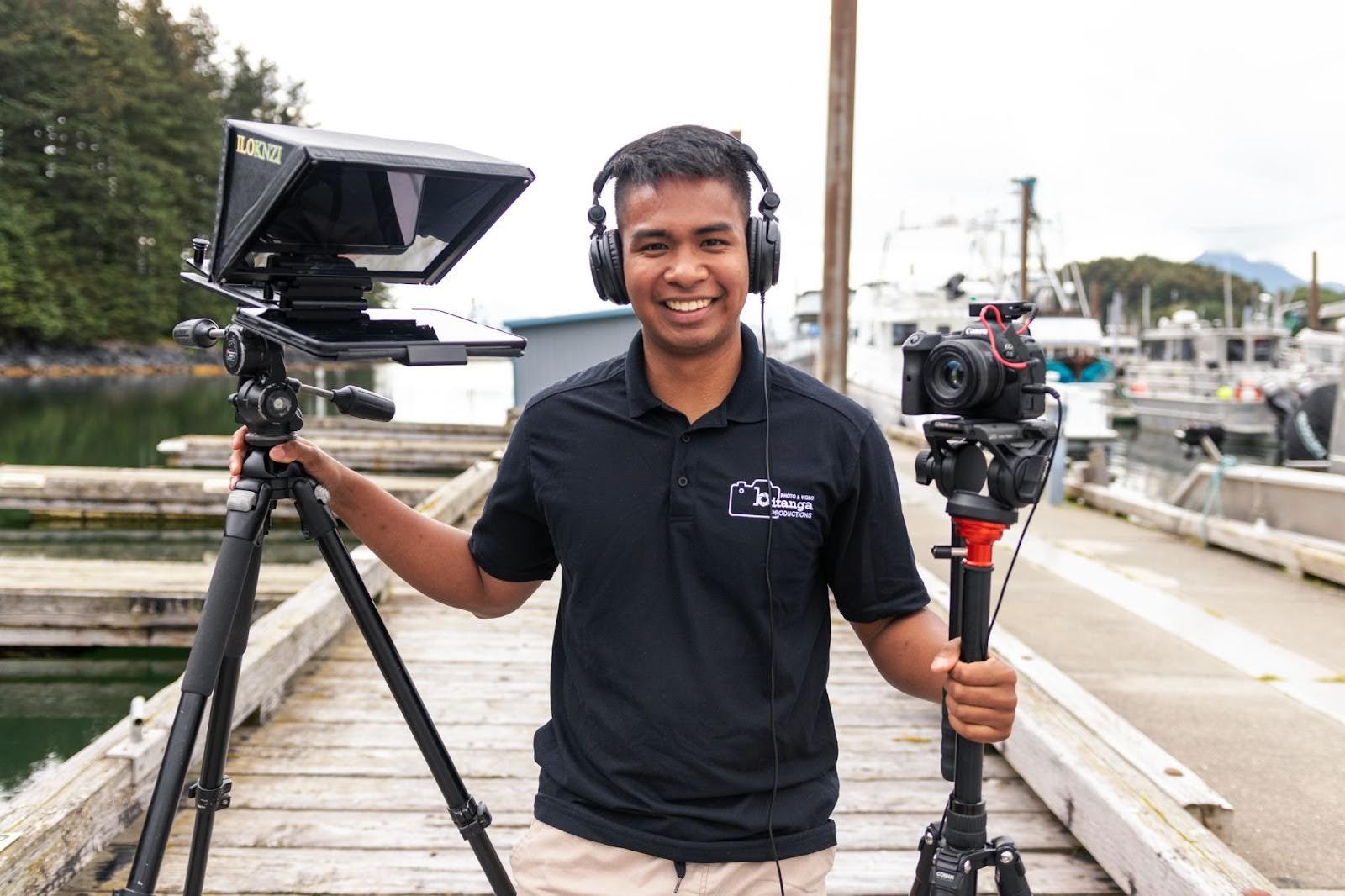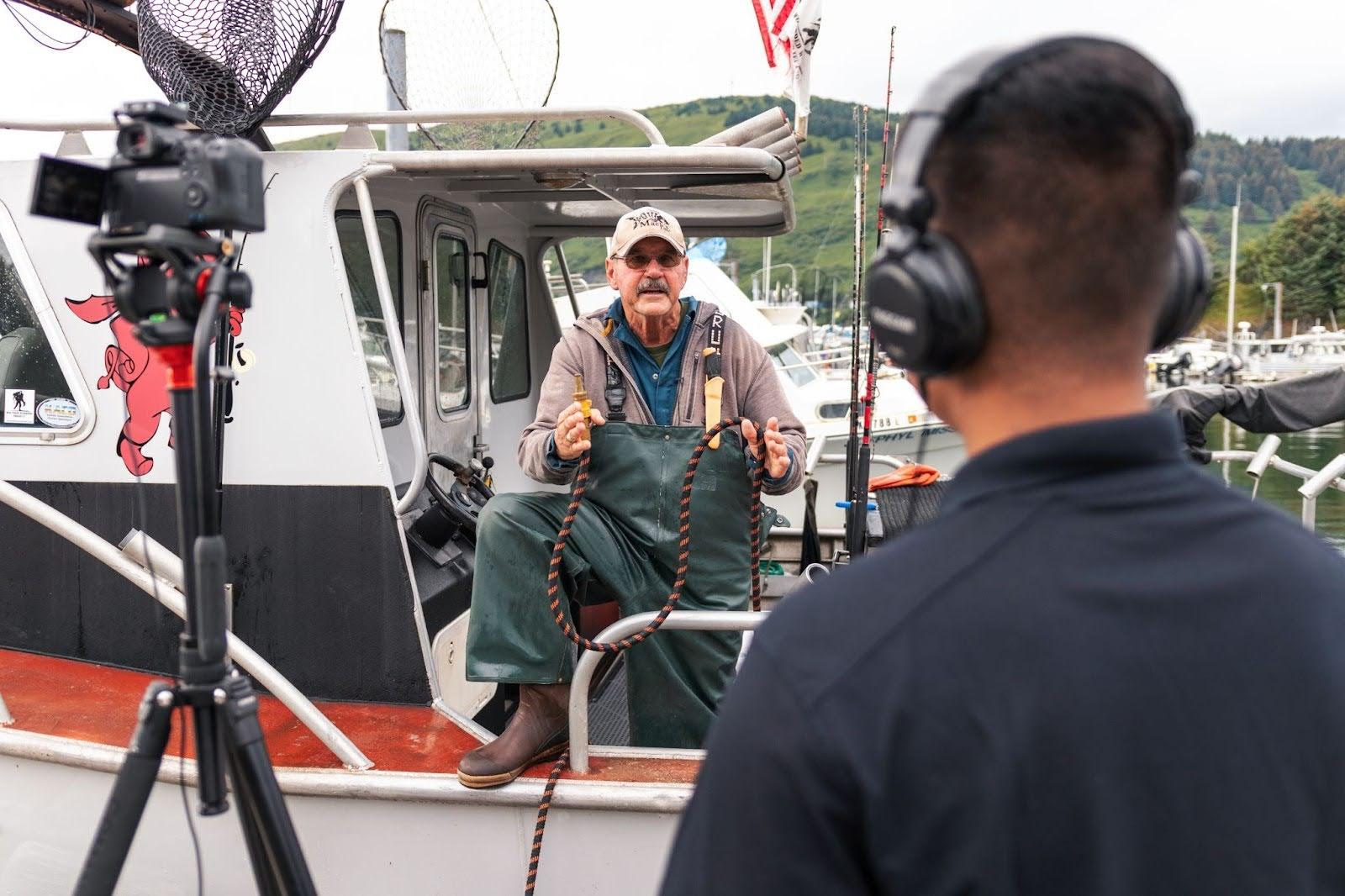
Rafael Bitanga with filmmaking equipment. Rafael Bitanga
Shoshi Bieler • December 24, 2024
One of the grant opportunities we offer at AKHF are our Stories Grants, which provide funding for projects that build a more inclusive narrative of Alaska’s past, present and future by amplifying stories that have been underrecognized or excluded from the public discourse. Projects might result in a short film, a printed publication, or a podcast, to name just a few of the incredible works we’ve seen come out of these grants. One such recent grant project was "Reconnecting Through Rhythm," a 2024 film by the Ketchikan Wellness Coalition, in partnership with filmmaker Rafael Bitanga. "Reconnecting Through Rhythm" tells the story of Alma Manabat Parker, a Filipina in Ketchikan, Alaska, as she embarks on a journey to reconnect with her Filipino heritage through the power of traditional Filipino dance. By learning and teaching traditional dance, Alma hopes to bridge the gap between her Filipino roots and her Alaskan life.
AKHF's Shoshi Bieler spoke with filmmaker Rafael Bitanga to learn more about why he tells stories through film and the people who have supported him along the way.

Rafael Bitanga with filmmaking equipment. Rafael Bitanga
Rafael Bitanga is a filmmaker from Kodiak Island, Alaska who focuses on the power of film and service to uplift others with dignity. Beyond film projects, he teaches filmmaking to youth and educators across Alaska through the nonprofit See Stories.
What draws you to storytelling work?
Before moving to Philadelphia, I lived in Kodiak for 13 years and the Philippines for 8 years. What got me into storytelling was telling my personal story through a film for a scholarship application with the Live Mas Scholarship with the Taco Bell Foundation. It was from there that I started to see that being able to share my personal stories not only uplifts me but it also allows others to begin reaching out and say, “Your story also resonates with me.” The power of storytelling is that one person’s story can reach multiple people from all different walks of life.
Was there a moment in your life when you just knew it was your calling to do what you do? Is there a story that you can share?
It’s very winding! I fell upon storytelling when See Stories first came to my class for a seventh-grade filmmaking workshop. The goal was to create a short 3-5 minute video. That was the first time I got introduced to video as a form of storytelling and highlighting the stories of immigrants – that drew me into filmmaking. In the Philippines, I was learning about my culture, but when I came to the US it stopped – it was about learning the sciences, learning English, a very Western type of education. Until Marie [Acemah, See Stories Executive Director] entered our classroom. That moment allowed me to follow the stories of Filipinos in Alaska, recording the story of a nurse and my older sister, Deborah. That was the beginning of my work in storytelling through the medium of filmmaking.
It's funny how life takes unexpected turns. Back in high school, I got into photography—I loved how I could tell stories through images. I wasn't even thinking about video until Marie came to me and said, "Hey, someone needs a wedding videographer!" She was kind enough to lend me her film camera, and the next thing I knew, I was filming weddings all through high school.
Then college came around, and here's where it gets interesting – I was super into cooking during high school, so I thought, "Why not pursue hospitality? I could become a chef, maybe open my own fine-dining restaurant someday!" But then 2020 hit, and well, we all know what happened. Everything shut down, and we all had to leave campus. With hospitality at a standstill, I found myself drawn back to filmmaking. During all that isolation, I started this really meaningful project, where I connected with young people across the US and Canada, interviewing them about their COVID experiences. That project changed everything for me! I never really committed to filmmaking as a career until then. Even after graduating from my hospitality program, I was lost, thinking, "What's next?" Sure, I could do photography and film, but I wasn't sure if that was "the path."
Then, I met Alma Manabat Parker, and she approached me with this amazing opportunity. She said, "I'm heading back to the Philippines and need someone to document this journey. Would you be interested?" That was my lightbulb moment. I realized filmmaking wasn't just some side gig – it was what I was meant to do. It had been there all along, but I kept pushing it aside, thinking I needed a "real" career. So here I am doing what I love – using filmmaking and storytelling to share people's cultures and ways of life. Sometimes, you have to take the long way around to end up exactly where you were supposed to be.
Even if we never meet the person watching, we're creating these invisible bridges between our experiences.
When you think about some of the people who helped you get to where you are today, who do you think of? Why do they stand out?
It's been an incredible chain of women in my life who've made my journey possible. They saw something in my work and believed in its power to touch others' lives. It really started with my older sister, Deborah. From when I was a kid, she shaped how I thought about storytelling. She was always digging deeper, asking me beautiful questions like "What do you feel?" or "Why do you think about things the way you do?" She kept pushing me to think about what story I wanted to share with the world. And then there's Marie – she's been my rock since seventh grade. Can you believe how long that is? She started as my teacher, and now we're colleagues. Talk about full circle!
Then Alma came into my life, and of course, every single person who's trusted me to tell their story through my documentaries. That's what makes this work so incredible – each person I meet brings a whole new perspective, a whole new story to tell. Without them, without their willingness to share their lives with me, my work wouldn't exist. I mean, I could tell my own story over and over, but there are only so many ways to spin that.
What gifts have you received (in any form) along the way?
I often think about what a privilege it is to tell stories. It's not something everyone gets to do, and honestly? There are still days when I doubt myself. I look at my bank account and think, "Is this even sustainable?" But it's strange – and kind of beautiful – how things work out. Just when I'm ready to throw in the towel, a grant appears. Call it coincidence, call it a calling... I'm still trying to figure that one out.
But beyond the financial stuff, this work has given me something special: validation! And let me tell you, this career is a wild ride – like being on a constant rollercoaster! But what keeps me going is connecting with people. When I'm working on a story, whether it's about Alma or a DACA student in Philadelphia, it's because something in their story sparks my curiosity. So in a way, I'm not just telling stories – I'm receiving this amazing gift of curiosity in return.
You know, it's funny – this actually ties back to why I studied hospitality in the first place. At its heart, storytelling is a form of service. When people trust you with their stories, it's like... well, it's like being handed something precious. You have to handle it with care.

Rafael Bitanga working on a film. Rafael Bitanga
I think about the recent Governor’s Arts and Humanities Awards celebration and how you had connections to two of the Humanities Awards nominees, which is so cool. Growing up in Kodiak, working with so many Alaskans whose lives and work often intersect and overlap… how, if at all, has that shaped how you think about our responsibility to one another?
Growing up on Kodiak Island, I used to look at my parents working in the salmon cannery and wonder, "What is our broader story? Is this what I will also do when I grow up?" Through much reflection, questioning, and listening to stories, I discovered how we're all so much more connected than I ever imagined.
Through storytelling, I've discovered something really powerful—this amazing web of experiences that connects people all across Alaska. I get to highlight these stories, find these threads that bind us together, and show the good in everyone. And to think, I've learned all this by 24! It makes me wonder what the next 24 years will bring.
I have to admit something—telling stories about my own Filipino community, that's actually the hardest part. There's this weight to it. I'm constantly thinking about expectations—my own and my community's. Like, am I representing us the right way? It's both a blessing and a burden if I'm being honest. But here's what I want other storytellers to know: while I can tell stories about my community that hopefully resonate with everyone, I shouldn't be the only one doing it. We need more voices and more perspectives. It's like passing a torch – we all are responsible for sharing our stories because that's how we learn and grow.
Take this fourth grader in Akiak making a film about fishing – they're teaching me something new about an experience I had in Kodiak, just done differently. That's what's so beautiful about sharing stories – even if we never meet the person watching, we're creating these invisible bridges between our experiences.
At its heart, storytelling is a form of service. When people trust you with their stories, it's like... well, it's like being handed something precious. You have to handle it with care.
Anything else I should have asked you about?
The concept of being ready. I often get asked, “When did you know you were ready to do this?” I did not know. Even up until now, I don’t think there was ever a moment in life where I was ready to take something on. There was just something in front of me, and it was either I took this direction or continued living the way I was living my life. It’s important for storytellers and story sharers to not overthink the situation they are in. When there’s a story that has to be told, and you’re the person who it fell upon, I think that’s a responsibility and a gift to put it into the world and share it. Whether through an essay, through a podcast, creating a film…resources will come where there’s energy flowing.
The Alaska Humanities Forum is a non-profit, non-partisan organization that designs and facilitates experiences to bridge distance and difference – programming that shares and preserves the stories of people and places across our vast state, and explores what it means to be Alaskan.
April 21, 2025 • Polly Carr
April 16, 2025 • Kameron Perez-Verdia
March 5, 2025 • Polly Carr